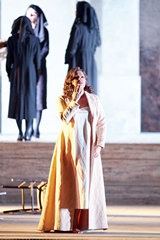| Opera Reviews | 25 April 2024 |
Il Trovatore scales the heightsby Moore Parker |
|
| Verdi: Il Trovatore Vienna State Opera 9 February 2017 |
|
|
A grand arched hall utilises the State Opera’s generous expanse and a steady (if slightly awkward) turnover of props, in addition to a pair of massive centre stage doors (which slide or swing as required to reveal an additional layer of visual support) to help drive the action forward. The open flame in some form or other is almost omnipresent (sometimes to dramatic effect, as in the searing wall which alights when Azucena is captured ) - whereby Manrico’s ultimate fate is succinctly sealed by a simple bullet as the final curtain comes down. Spanning a couple of generations, the cast is generally well balanced - with the Troubadour himself bringing decades of craft and technique to a role that is essentially a notch beyond his natural vocal resources. Roberto Alagna’s initial moments offstage were alarming, with the dry acoustic of the wings and lack of direct vocal presence highlighting the tenor’s unsteadiness and splayed timbre. However, the Act I trio saw a remarkable transformation in which the voice seemed to settle - and indeed blossom - and thereafter a fine legato, sense of pacing, and the ability to convey and communicate emotion won the day - and the audience’s warmest affection. For the record (in evident contrast to Sunday’s premiere), his "Stretta" included a sustained (if not quite unlabored) high C. On a par artistically, Luciana D’Intino (who debuted, incidentally, in this house over 20 years ago) displayed not just the ideal vocal substance and maturity, but a dramatic and musical instinct to make hers the most compelling and moving interpretation of the evening. This performance found Anna Netrebko in mellifluous vocal form, simply but elegantly costumed (Carla Teti) to display ankles which compete with any young ballerinas. For whatever reason, coy and unconvincing histrionics were set for the opening numbers and the interpretation only truly established emotional sincerity from "D’amor sull’ali rosee" onwards. This scene was performed with superb poise, serving as an ideal showcase for the soprano’s ravishingly pure register above the stave with its seamless diminuendi and finely-spun pianissimi, and which impressively helped offset any penalties for questionable mid-range focus and indifferent scale work. As Ferrando, Jongmin Park impressed with knife-edged accuracy, dramatic intensity, and an ominously biting tone. Both Simina Ivan (Ines) and Bror Magnus Tødenes (Ruiz) guaranteed for discreet and luxurious support. Marco Armiliato led the musical proceedings from memory with meticulously-inspired acumen, circumventing any risk of triteness and providing his cast with expansive but malleable support to savour their big numbers, while contrasting with effervescent tempi in the ensuing cabalette. Pristine contributions by both chorus and orchestra and a triumph for all at the final curtain.
|
|
| Text ©
Moore Parker Photo © Wiener Staatsoper / Michael Pöhn |

 Infamously elusive to produce, Verdi’s Il Trovatore poses an interminable challenge to any director - and as such, Daniele Abbado deserves credit for his updated one-set (Graziano Gregori) version - transported to the 20th century Spanish civil war - in which the plot and its protagonists gain reasonable credibility and homogeneity within the framework of Verdi’s popular score.
Infamously elusive to produce, Verdi’s Il Trovatore poses an interminable challenge to any director - and as such, Daniele Abbado deserves credit for his updated one-set (Graziano Gregori) version - transported to the 20th century Spanish civil war - in which the plot and its protagonists gain reasonable credibility and homogeneity within the framework of Verdi’s popular score.





